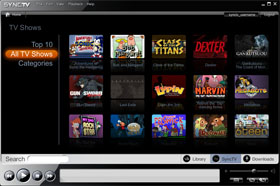 If you didn’t see the 90 minute MacWorld keynote here is a quick summary of the product launches yesterday. Jobs photo courtesy of Apple.
If you didn’t see the 90 minute MacWorld keynote here is a quick summary of the product launches yesterday. Jobs photo courtesy of Apple.
- Ad: Hi I’m a Mac and I’m a PC — New Years ad ran which poked fun at Vista…what are you going to do in ’08… Then Jobs enters stage.
- Time Capsule: backup hardware device the same size as the Apple TV product. Two models both include Airport 802.11N in a 500MB and 1TB configuration. Priced at $299 and $499 works in conjunction with Time Machine (back up system) which is included in OS X Leopard.
- iPhone: 4M sold in the first 200 days (averaged ~20K/day); currently has 19.5% MSS (more than combining the bottom three companies – Palm (9.8%); Motorola (7.4%); Nokia (1.3%). Enhancement announced:
- Maps w/ locations (joint effort by Google and Skyhook Wireless (drove the US & Canada mapping 23M wi-fi hot spots and allows triangulation on the hot spots. Google triangulates off cell towers and Apple uses both systems in iPhone for identifying location)
- Webclips (clipping links to favorite web sites or sub-site
- Custom home screen (up to 9)
- SMS multiple people at the same time was only one prior
- Chapter search for videos and song lyric’s displayed if available
- Free software update for all current owners which include the above enhancements
- iTunes: 4Billion songs sold through iTunes; Christmas day sold 20M songs in one day – highest ever; 125M TV shows sold (more than any other service); 7M movies sold (more than anyone, but didn’t meet expectations). Enhancements announced:
- iTunes Movie Rental (music users have not wanted music rental); Studio’s on board at launch (20th Century Fox, TouchStone, Miramax, MGM, Lions Gate, New Line Cinema, WB, Disney, Sony, Paramount, Universal – essentially all of the studios; More than 1000 films by February
- Films available for rental in the 30 days after DVD release
- Watch anywhere (PC, iPod or TV)
- iPod Touch added 5 new apps including maps, email, SMS, web clips and chapter search
- Didn’t state, but looks like progressive download as the movie starts within seconds of the rental purchase
- 30 days to watch the movie and 24 hours watch it once started
- Can transfer the movie watching to another device in the middle (start on a PC then xfer to iPod for a flight)
- DVD quality, but also providing Hi-Def (100 titles today growing fast) with 5.1 Dolby surround sound
- Pricing is DVD library release – $2.99; DVD New Release – $3.99; HD library – $3.99 and HD new release – $4.99
- Service started today in the U.S. and goes International later this year
- Apple TV: stated that we’ve all missed (Microsoft, Netflix, Nubu and other logos on screen) how to get the movies to the flat panel in the living room. Apple TV was designed as an accessory for iTunes & computer, but it’s about Movies, Movies, Movies. Enhancements announce:
- Price dropped from $299 to $229
- All new user interface
- Leverages the new iTune movie rental service
- Rent directly from the Apple TV box – no computer needed now
- Photo from Flickr can be streamed or from your dot mac accounts
- Will auto sync with your computer if you want
- Free software upgrade to all existing users and get the functionality
- 20th Century Fox: Jim Gianopolos (Chairman & CEO) on stage to discuss movie rental deal. Talked about biz models being super important, gushed about how great it is to work with Jobs and put a major plug in for Blu-ray winning the format war as the crowd applauded.
- MacBook Air: launched a new ultra-thin MacBook to compliment the notebook line up. Standard model priced at $1799. Model with the 64GB SSD flash over $3K,. Compared the “Air” to the Sony TZ series which had previously set the benchmark in this category. The thickest part of the Air is thinner than the thinnest part of the Sony for comparisons. Features:
- .76 to .16 thin (no optical device, can get one external if you need)
- 13.3 inch LCD back light display
- Full size and backlight keyboard
- Multi-touch (similar to the iPhone – swipe, pinch etc.) capability on the trackpad
- 80GB HDD and optional 64GB SSD (pricey however)
- 2GB memory and 1.6GHz Core 2 Duo (C2D) standard or optional 1.8GHz
- 802.11N and Bluetooth 2.1 with EDR
- Usage model changing and driving wireless even for software download – now leverage a PC optical drive across the network
- Talked about environment: mercury free, arsenic free glass, Bromide Fire Retardant (BFR) and PVC free
- 56% less packaging waste
- Jobs applauded the joint effort and working with Intel
- Intel: Paul Otellini was invited on stage to evangelize the 30% reduced form factor of the C2D. Gave Jobs a souvenir of one and gushed about how great it was to work with Apple. For those of you into little known factual tidbits, it was interesting to note that the video graphic overlay while Paul walked on stage used the old Intel dropped “e” logo. The graphic/name/title on the projected stage TV was correct.
- Summation: In the first 2 weeks of the New Year Apple launched:
- Fastest ever Mac Pro desktop system
- Time Capsule
- Software updates for iPhone, iPod Touch along with new apps for Touch
- iTunes Movie Rental
- Apple TV (software upgrade) along with HD video content
- MacBook Air – Ultra thin laptop
- Last slide stated…And there’s still 50 weeks left….

- Randy Newman: Music artist extraordinaire played a couple songs for the audience. Newman photo courtesy of YouTube. He starts by telling us about his trip to Europe, where he noticed that “they don’t like us so much.” And he sang a song he wrote about it…”A Few Words in Defense of Our Country.”
A couple of parting thoughts about Randy Newman. The song choice was odd. If Apple signed off on the first song he sang they have some guts. A little piano ditty that compares the U.S. to Nazi Germany, Stalinist Russia and Europe during the time of the Inquisition. Now that’s an interesting mix of art meeting commerce. Highly political and bashed a number of things which will only add to the blog fodder I’m sure.
 Just days before the Consumer Electronics Show (
Just days before the Consumer Electronics Show ( Let’s see, I slept for 7 hours; it’s a new day and an announcement of yet another start up in the internet video space.
Let’s see, I slept for 7 hours; it’s a new day and an announcement of yet another start up in the internet video space.

